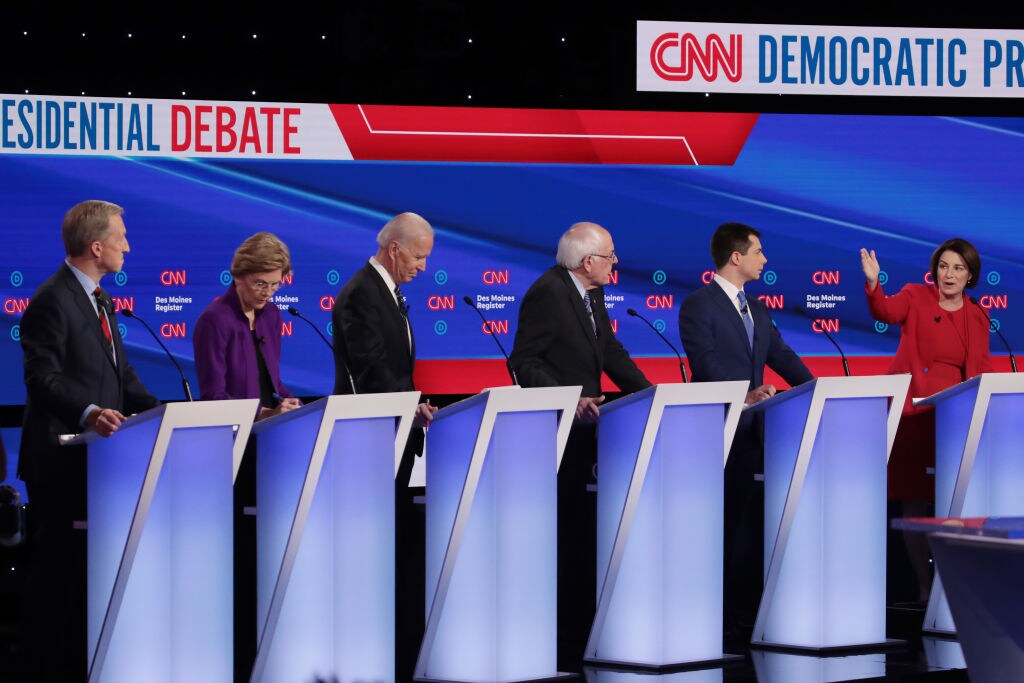It took five debates — and, eventually, a full panel of female moderators — to produce a single question about the importance of child care to American families, even though the issue has been at the forefront of national politics on both sides of the aisle.
But on Tuesday night in Iowa — just weeks ahead of the Iowa caucuses, and where the state legislature is considering legislation to address the child care crisis — the candidates were finally given the chance to address their child care proposals at length, and in depth. (For more, read our full breakdown of the Democratic candidates’ child care policy proposals.)
Immediate responses on Twitter from several viewers of the debate were overwhelmingly positive:
Tellingly, when child care took center stage in Iowa, it was because of questions from Iowa voters. The first, for Pete Buttigieg: “As a young mom, I had to quit a job I loved because child care costs were taking up two-thirds of my income … how will you prioritize accessing quality, affordable child care in your first 100 days in office?”
Buttigieg, who has released a plan to cap child care costs for most families, said, “We’ve got to drive it to 7% [of household income] or below” — the rate deemed affordable by the federal government — “and zero for those families living in poverty.” Acknowledging that child care cost is affecting families at all income brackets — in fact, Care.com has found that 70% of U.S. families pay more than 10% of their income on child care — Buttigieg pledged to use federal money to make care more affordable, and “to build a workforce of people who are paid at a decent level to offer early childhood education.”
Senator Elizabeth Warren was asked about the difference between her plans on public college — which would be free — and universal child care, which would be free only to those who meet certain income criteria. Warren acknowledged that some people would contribute “a small payment” — in fact, she would cap child care costs at 7% of household income — before pivoting to her personal story as a single working mom and the need to provide universal Pre-K for all families. Her plan, she said, would also “stop exploiting the people who do this valuable work, largely black and brown women. We can raise the wages of every child care worker and pre-school teacher in America. That’s an investment in our babies, that’s an investment in their mamas and their daddies, and that’s an investment in our teachers and in our economy.”
Next up: Senator — and former Head Start teacher — Bernie Sanders, who was asked whether child care should be free for all regardless of income. He answered by first touting the emotional and intellectual value of early childhood education — and contrasting it with the wages earned by child care educators, who often make less, he said, than workers at McDonald’s. “We need to fundamentally change priorities in America,” Sanders said. “We should not be one of the few countries that does not have universal, high-quality, affordable child care.”
Infant care, former Vice President Joe Biden was told, is more expensive than in-state college tuition in more than half the country. Does he support universal free infant care? “There should be free universal infant care,” Biden said, going farther than he has in the past. “I was a single parent, too,” he said, referring to his time as a young senator, after his wife and daughter were killed in a horrific automobile accident that also injured his two surviving sons. “I was making $42,000 a year. I commuted every single solitary day to Wilmington, Delaware … because I could not afford child care. It was beyond my reach.” Biden said he wants to increase funding for pre-K and after-school programs; and establish an $8,000 tax credit, which he claimed will put 7 million women back to work.
While not every candidate got a chance to weigh in, this was — as New America’s Vicki Shabo called it — “the most robust conversation about working families in any debate so far.”
And that included Amy Klobuchar weighing in on some of the other challenges facing millennials and sandwich-generation women in the workplace:
Tuesday night’s debate was, first and foremost, an acknowledgement that working parents will be a huge voting block in 2020 — and that child care has emerged as a key economic issue on both sides of the aisle. It was also especially gratifying for the researchers, non-profits, and think tanks who’ve been working tirelessly to generate a wealth of child care research and data backing up the economic, social, and fairness behind the case for building America’s care infrastructure:






